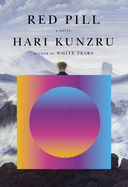
What appears to be an average midlife crisis for an agitated midcareer male writer tumbles headlong toward existential apocalypse in Hari Kunzru's engrossing, mind-bending sixth novel, Red Pill. From the outset, the narrator is sleepless and skeptical of the high-minded Deuter Center in Wannsee, Germany, where he has taken up a fellowship in both an effort to find himself and produce a book about the Self. His desire for privacy, however, conflicts with the establishment's utopian ideals of openness. So, instead of working under scrutiny in the glass-walled workroom with the other fellows, he hides away in his room, where he videocalls his wife and daughter back in New York, eats Chinese takeout and binges the police drama Blue Lives.
Kunzru (White Tears) takes his time to establish the true stakes of this novel, which emerge organically from a scatterplot of dilemmas about privacy and openness, surveillance and security, paranoia and gaslighting, collective good and individual glory. But it all snaps into an anxious overdrive when the narrator enters an unlikely but ruthless showdown of ideas with Anton, the dapper American creator of Blue Lives, whose subliminal messaging may be trying to summon a brutal future world. "You know what the best part is?" Anton laughs after performing an esoteric Nazi salute. "I'm going to be living rent free in your head from now on."
Amid the rising tide of nationalist politics worldwide, Kunzru has intrepidly traversed the festering neofascist underbelly of the Internet Age so readers don't have to. Red Pill is a virtuosic portrait of the moment. --Dave Wheeler, associate editor, Shelf Awareness

